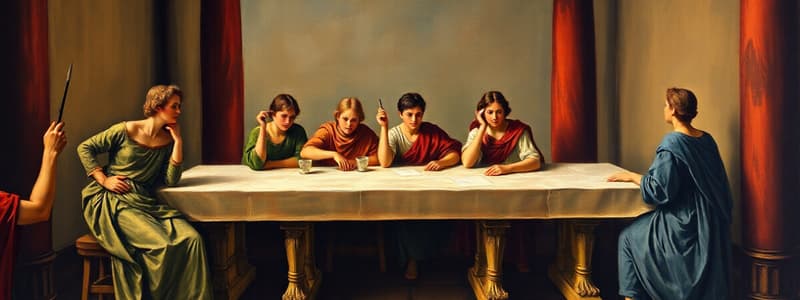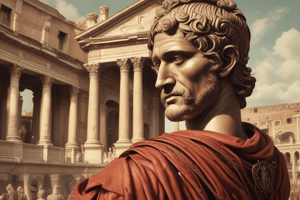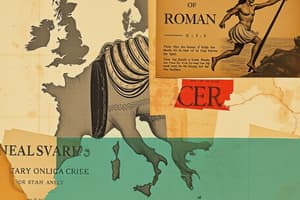Podcast
Questions and Answers
What significant action did Caesar take that directly defied the senate's authority?
What significant action did Caesar take that directly defied the senate's authority?
- He appointed himself governor of Gaul.
- He abolished the position of consul.
- He declared war on Pompey.
- He took his army across the Rubicon River. (correct)
What was one of the major reforms that Caesar implemented during his rule?
What was one of the major reforms that Caesar implemented during his rule?
- He granted Roman citizenship to many in the provinces. (correct)
- He disbanded the legions.
- He reinstated traditional Roman values.
- He reduced the power of the senate.
Which of the following battles did Caesar NOT participate in after crossing the Rubicon?
Which of the following battles did Caesar NOT participate in after crossing the Rubicon?
- The battle of Greece
- The battle of Egypt
- The battle of Spain
- The battle of Gaul (correct)
What led to Caesar's assassination in 44 B.C.?
What led to Caesar's assassination in 44 B.C.?
Which phrase did Caesar reportedly utter before his assassination?
Which phrase did Caesar reportedly utter before his assassination?
What was one major consequence of the reforms proposed by Tiberius and Gaius Gracchus?
What was one major consequence of the reforms proposed by Tiberius and Gaius Gracchus?
How did the military dynamics change during the period of upheaval in the Roman republic?
How did the military dynamics change during the period of upheaval in the Roman republic?
What prompted many small farmers to sell their lands and become homeless?
What prompted many small farmers to sell their lands and become homeless?
What was a notable result of the civil war that followed the deaths of the Gracchus brothers?
What was a notable result of the civil war that followed the deaths of the Gracchus brothers?
What was the significance of Julius Caesar's political alliance in 60 B.C.?
What was the significance of Julius Caesar's political alliance in 60 B.C.?
What virtue described the Roman values of discipline, strength, and loyalty?
What virtue described the Roman values of discipline, strength, and loyalty?
Which emperor is known for the considerable building program during his reign?
Which emperor is known for the considerable building program during his reign?
What was a common aspect of the administration of Nero?
What was a common aspect of the administration of Nero?
Which emperor's reign marked the consolidation of earlier conquests?
Which emperor's reign marked the consolidation of earlier conquests?
During the period of the Roman Empire, most people lived in which environment?
During the period of the Roman Empire, most people lived in which environment?
Flashcards
Small Farmers' Struggle
Small Farmers' Struggle
Small farmers in ancient Rome found it hard to compete with large estates worked by enslaved people. This led to many losing their land and becoming poor.
Landless Former Soldiers
Landless Former Soldiers
Many former Roman soldiers, after losing their lands, became unemployed and homeless, forced to work as seasonal laborers or migrate to cities.
Urban Poor in Rome
Urban Poor in Rome
About one-fourth of Roman society consisted of urban poor people, including many former farmers and soldiers.
Tiberius and Gaius Gracchus
Tiberius and Gaius Gracchus
Signup and view all the flashcards
Land Reform Proposals
Land Reform Proposals
Signup and view all the flashcards
Civil War
Civil War
Signup and view all the flashcards
Military Upheaval
Military Upheaval
Signup and view all the flashcards
Julius Caesar
Julius Caesar
Signup and view all the flashcards
Citizen-Soldiers
Citizen-Soldiers
Signup and view all the flashcards
Military Leaders gaining power
Military Leaders gaining power
Signup and view all the flashcards
Roman Values
Roman Values
Signup and view all the flashcards
Roman Practicality
Roman Practicality
Signup and view all the flashcards
Roman Emperors (Bad)
Roman Emperors (Bad)
Signup and view all the flashcards
Roman Emperors (Good)
Roman Emperors (Good)
Signup and view all the flashcards
Roman Empire Extent
Roman Empire Extent
Signup and view all the flashcards
Rural Population
Rural Population
Signup and view all the flashcards
Caesar's election as Consul
Caesar's election as Consul
Signup and view all the flashcards
Roman Triumvirate
Roman Triumvirate
Signup and view all the flashcards
Caesar's Gaul Conquest
Caesar's Gaul Conquest
Signup and view all the flashcards
Caesar's crossing the Rubicon
Caesar's crossing the Rubicon
Signup and view all the flashcards
Caesar's military victories
Caesar's military victories
Signup and view all the flashcards
Caesar's appointment as Dictator
Caesar's appointment as Dictator
Signup and view all the flashcards
Assassination of Caesar
Assassination of Caesar
Signup and view all the flashcards
Caesar's reforms
Caesar's reforms
Signup and view all the flashcards
The Rubicon River
The Rubicon River
Signup and view all the flashcards
Pompey
Pompey
Signup and view all the flashcards
Study Notes
Roman Republic
- Early Romans established a republic, gaining significant power and influence.
- Rome's civilization emerged from a small settlement to a vast Mediterranean empire.
- Rome's origins, according to legend, date back to 753 B.C. with the founding by Romulus and Remus
- The city was strategically built on seven rolling hills at the curve of the Tiber River, midway between the Alps and Italy's south, near the midpoint of the Mediterranean Sea.
- Early settlers were primarily Latins.
- The Etruscans heavily influenced Roman architecture.
- The early republic was marked by conflict between patricians (wealthy landowners) and plebeians (common farmers, craftspeople, and merchants.)
- Patricians originally held most of the power, while plebeians were citizens with voting rights but faced limitations.
- Twelve Tables, a written law code, protected the rights of plebeians.
The Early Republic
- The Romans rejected the monarchy, forming a republic in 509 B.C.
- A republic is a form of government in which power rests with the citizens who vote for leaders.
- Patricians were the wealthy landowners who held considerable power.
- Plebeians were the common farmers, laborers. and merchants, constituting the majority.
Rome Spreads Its Power
- Rome's power grew slowly, extending across Italy.
- Roman authority extended over nearly all of Italy by 265 B.C.
- Different treatment was established for various conquered territories in Italy : some became citizens of Rome, others allies.
- The Roman Army was a strong force and key to spreading Rome's power.
- The Punic Wars were a series of conflicts between Rome and Carthage (264 B.C. -146 B.C).
- Hannibal, a Carthaginian general, led a famous invasion of Italy during the Second Punic War (218-202 B.C).
- The Roman legions' military strategy and organization proved critical to Rome's successes.
Studying That Suits You
Use AI to generate personalized quizzes and flashcards to suit your learning preferences.




